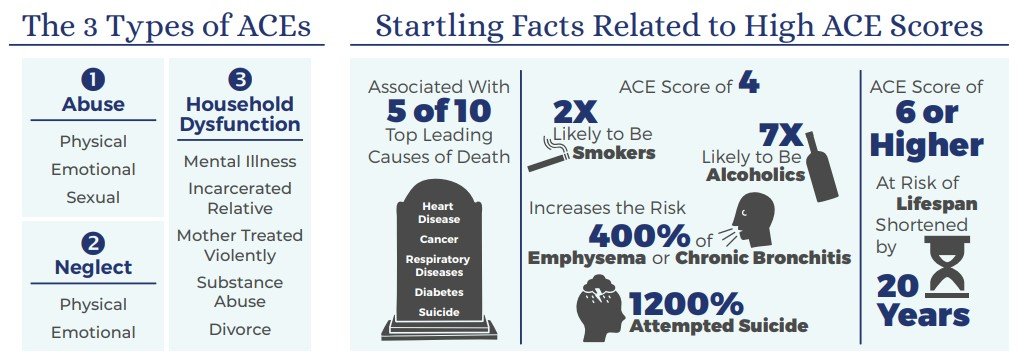Adverse Childhood Experiences - (ACES)
The Effects of Early Childhood Traumatic Experiences on our Lives
Introduction:
We at SAYS believe it is essential to be informed about the impact of childhood experiences on mental and physical health. This guide aims to provide you with essential information about Adverse Childhood Experiences (ACES) and how they relate to trauma research and life outcomes. Understanding ACES can help us build a more compassionate and informed community. Let's get started!
What are Adverse Childhood Experiences (ACES)?
The term ACES is short for a study that considered stressful or traumatic events that children may experience before the age of 18, and how those events impact an individual's physical and mental health throughout their lifetime. Examples of the traumas considered in the ACES study include physical, emotional, or sexual abuse, neglect, household dysfunction (such as substance abuse, mental illness, or domestic violence), or parental separation/divorce.
The ACE Study
The ACE Study, conducted by the Centers for Disease Control and Prevention (CDC) and Kaiser Permanente, is a groundbreaking research project that explored the relationship between ACES and long-term health outcomes. The study found a strong link between the number of ACES an individual experienced and an increased risk of developing health issues later in life, such as heart disease, diabetes, depression, substance abuse, and more. The study found that a significant portion of the population had experienced at least one ACE. About two-thirds of participants reported at least one ACE, and more than one in five reported three or more ACEs.
Understanding the Impact of ACES:
Physical Health:
ACES can have a cumulative effect on physical health. Chronic stress resulting from traumatic experiences can lead to biological changes that increase the risk of physical illnesses. The ACE study revealed a strong correlation between childhood trauma and health-risk behaviors. For example, individuals with a higher ACE score were more likely to engage in smoking, multi-substance use, and risky sexual behaviors. The study also highlighted the potential impact of childhood trauma on human lifespan. Individuals with a higher ACE score were more likely to have a shorter life expectancy.
Mental Health:
Childhood trauma is closely associated with the development of mental health disorders. The study also showed a strong connection between ACEs and mental health outcomes. People with a history of childhood trauma were more likely to experience depression, anxiety, post-traumatic stress disorder (PTSD), and dissociative disorders.
Social Functioning:
ACES can influence an individual's ability to form healthy relationships, trust others, and maintain social connections.
Cognitive Functioning:
Childhood trauma may impair cognitive abilities, impacting learning, memory, and decision-making skills.
Interconnectedness of ACEs:
The study underscored the cumulative nature of ACEs. Experiencing multiple ACEs increased the risk of negative health outcomes exponentially. The study demonstrated that ACEs often co-occur; for example, individuals who experience abuse are also more likely to report experiencing household dysfunction or neglect.
Building Resilience and Support
While ACES can have profound effects, it's essential to remember that resilience and support systems play a crucial role in mitigating the impact of trauma. Here are some strategies:
Trauma-Informed Approaches: Promote understanding and awareness of trauma's effects on individuals and communities.
Safe and Supportive Environments: Create environments that foster safety, trust, and open communication.
Access to Mental Health Services: Ensure access to appropriate mental health resources for those affected by ACES.
Community Support: Encourage a supportive community that offers empathy and understanding.
Getting Involved and Creating Awareness
As part of our mailing list, you can play a significant role in raising awareness about ACES and trauma research. Here are some ways to get involved:
Share Information: Educate your friends, family, and social circles about ACES and their impact on health.
Advocate for Change: Support policies that address trauma, mental health, and social support services.
Volunteer: Get involved with local organizations that focus on trauma-informed care and support for at-risk individuals.
Conclusion:
Understanding Adverse Childhood Experiences (ACES) is crucial in building a compassionate and supportive community. By being aware of the impact of childhood trauma, we can work together to create a safer and more resilient environment for everyone.
It's important to note that the ACE study contributed significantly to our understanding of the long-term health effects of childhood trauma, but it's not the only research in this field. Trauma-informed care and interventions have been developed based on the findings of the ACE study to address and mitigate the impact of childhood trauma on health outcomes.
For the most up-to-date and detailed statistics, it's recommended to refer directly to the published research articles and reports related to the ACE study or consult with experts in the field of trauma and public health.
Thank you for joining our mailing list, and we look forward to fostering awareness and understanding together. If you have any questions or need further information, feel free to reach out to us.
For additional in-depth information on ACES, visit the CDC website at:
https://www.cdc.gov/violenceprevention/aces/about.html


